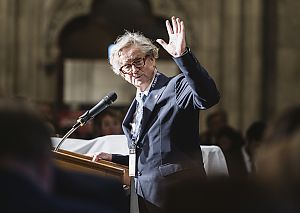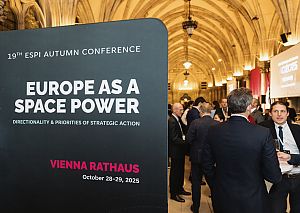Ludwig Möller: Building Bridges in Europe’s Space Future

Trained in telecommunications, Möller began his career at Siemens, where he worked on early global fiber-optic networks "thirty years before you'd start doing the same thing in space." Later, at the European Patent Office, he witnessed the convergence of computing and telecommunications.
The move to the space sector felt like a logical next step. "Space today is where the transformative innovation happens," Möller says. "Semiconductors and the Internet each had their moments decades ago. Now it's space's turn, and this is something Europe can still actively shape."
For him, space goes beyond technology. "Space always has two facets," he says. "The visionary one with the astronauts, and exploration – and the practical one with Earth observation, climate, security, and innovation.
In Europe, it's sometimes harder to get public support through the purely inspirational side. But it's still an enormous advantage to have both. Space is cool. Talk to any kid and you'll see. And at the same time, it's useful: it protects the planet, drives technology, and supports our economies. If you find another field that connects imagination and impact so perfectly, let me know," he laughs. "I haven't found one yet."
It's also what underpins his broader philosophy of connection. The idea of bridges between disciplines, nations, and perspectives has become the defining theme of his leadership at the European Space Policy Institute (ESPI). It was also the guiding metaphor of this year's Autumn Conference that took place from the 28th to the 29th of October in Vienna, where policymakers, entrepreneurs, and strategists gathered under a title that sparked conversation across the continent: Europe as a Space Power.
Is Europe a Space Power?
"The most important takeaway," Möller reflects, "was actually the reaction to the title." The phrase Space Power was, "a statement of ambition, one Europe wouldn't have dared to articulate not so long ago."
In the packed conference room, delegates from more than 60 countries debated what it would mean for Europe to take itself seriously as a space actor. Remarkably, about half of them had come from outside the continent, representatives of nations and agencies that, as Möller notes, were openly searching for new partners and alternative powers in the rapidly evolving global space landscape. "There was an energy in the room," he recalls. "It felt like someone inviting to dance, and someone ready to be invited."
The discussions revealed both Europe's strengths and its self-doubt. A representative from the Saudi Space Agency pointedly remarked, "Europe is a space power. It's like the second-best student saying they're not a good student." At the other end of the spectrum, others challenged Europe to confront its own complacency and define what "space power" should mean in practice.
Möller welcomed both perspectives. "That's part of growing up," he says. "You need people who challenge your ambition. That's how a system matures. And I think most of the room agreed: Europe has been a space power before and can be one again."
He points to Europe's world-class programs like Copernicus for Earth Observation, EUMETSAT for Weather Services, and Galileo for Positioning, Navigation and Timing. "These are global benchmarks," he says. "We sometimes forget how good they are because they're so stable, so reliable. Add to that the fact that Europe has probably the highest density of educated people in the world, and some of the most innovative smaller nations. The ingredients are there."
He also points out that countries like Germany and France now have ministries explicitly responsible for space. "The political will in Europe is growing again, and in some cases, we're seeing investments double."
Austria's Strengths in Space

ESPI, Europe's leading think tank for space policy, has been headquartered in Vienna since 2002. The city, which is also home to the United Nations Office for Outer Space Affairs, won the bid to host ESPI over rivals like Italy, France, and the UK. "It made sense," he says. "Vienna was already a global hub for space diplomacy."
Two decades later, the role remains central. Austria may not be the first country that comes to mind when people think of space, yet it consistently manages to punch above its weight. Some of Europe's most influential space companies were founded by Austrians – among them Daniel Metzler of Isar Aerospace, the founders of OroraTech, and Peter Platzer of Spire Global. Also, the Director General of ESA hails from Austria and the country's contributions to ESA missions are too many to list.
Asked about Austria's place within this broader landscape, Möller is optimistic yet pragmatic. "The challenge for any country, and for Europe as a whole, is to create an ecosystem that is attractive enough to keep its brightest minds," he says. "Austria does an excellent job in creating talent; its R&D spending relative to GDP is significant."
For Möller, the solution lies not only in producing talent, but in creating the right environment for talent to thrive. "You need a clear market framework, political direction, and adequate funding," he explains. "If you want your innovators to grow at home, you must prepare the conditions for them."
He points to Switzerland as an instructive comparison: a country of similar size that has managed to turn strategic focus and long-term investment into global competitiveness. "Austria should set itself a similar level of ambition," he says. "And by ambition, I don't mean small, incremental steps, but a willingness to take bold, non-linear ones."
Europe, Möller believes, is entering a decisive phase, and Austria has every opportunity to be part of it. "We are in a disruptive moment," he concludes. "You can't think in straight lines anymore. You have to step up. And I hope Austria will be right there when Europe does."
